September 13, 2025 | 04:56 GMT +7
September 13, 2025 | 04:56 GMT +7
Hotline: 0913.378.918
September 13, 2025 | 04:56 GMT +7
Hotline: 0913.378.918
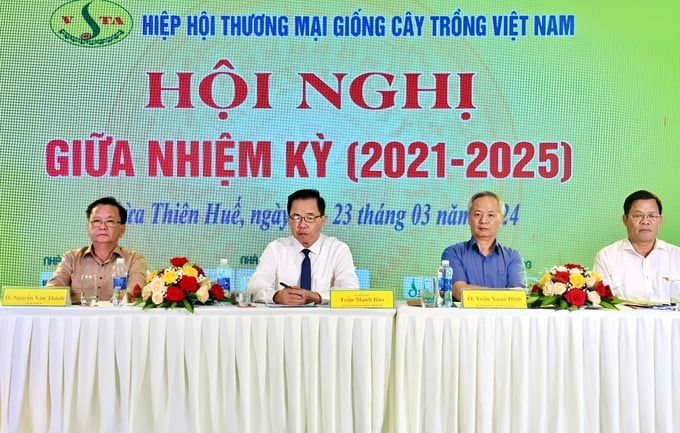
During the midterm conference for 2021-2024, Mr. Tran Manh Bao, Chairman of the Association, announced that VSTA is determined to host the 2026 Asia-Pacific Seed Conference (APSA). Photo: PT.
The Vietnam Seed Trade Association held its the midterm conference for 2021-2024 on March 23 in Hue city.
Within the framework of the conference, the workshop "Crop Varieties in the Strategic Development of Vietnam's Agricultural Sector" affirmed the role and position of the Association in Vietnam's agricultural development strategy.
Mr. Tran Manh Bao, Chairman of VSTA and Thaibinh Seed Group, emphasized the crucial role of crop varieties in the agricultural production system. Consequently, strengthening the crop variety sector is a decisive factor in determining the future development of agriculture.
Accordingly, the Vietnam Seed Trade Association was established to meet the demands of production and trading. The Chairman stated that the Association will focus on four major directions in the near future.
Firstly, enhancing connections and providing guidance to member businesses on modern scientific technologies, with an emphasis on biotechnology, towards industrializing the crop variety sector.
Secondly, proposing amendments to problematic and unrealistic legal documents and regulations.
Thirdly, implementing workforce training, fostering the connection between businesses and farmers, and between associations.
Fourthly, promoting international cooperation to transfer and apply technology, and expand markets.
"VSTA is determined to host the 2026 Asia-Pacific Seed Conference. This determination is well-founded as we are confident in Vietnam's infrastructure. However, the Association must make further efforts to enhance its capacity to undertake this task," shared Mr. Tran Manh Bao.
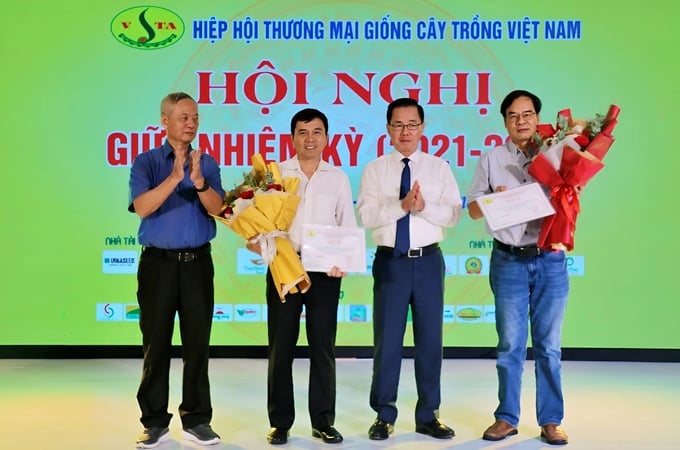
The Vietnam Seed Trade Association welcomeing two new members during the midterm conference. Photo: PT.
With regards to its role and objectives, the Vietnam Seed Trade Association organized the midterm conference to assess the Association's activities in the first half of the fourth term (from 2021 to 2023), and to outline directions for the future to achieve the goals set forth by the Fourth Congress's resolutions.
Regarding VSTA's activities following the Congress, i.e: from 2021 to 2023, Mr. Tran Xuan Dinh, Vice Chairman and General Secretary of VSTA, reported that the Association's members have consistently fulfilled their tasks of producing and supplying agricultural crop seeds, including rice, maize, and various types of vegetables.
The Association comprises leading businesses actively contributing to the research, breeding, production, and trading of agricultural crop seeds, including the Vietnam Seed Group (Vinaseed), ThaiBinh Seed Group, ADI Company, Quang Ninh and Nam Dinh Seed Companies, Hue Seed Company, Bac Giang Agricultural Technical Supply Company, Hai Duong Seed Company, seed centers, and foreign direct investment (FDI) companies.
Every year, VSTA member businesses produce and import approximately 500,000 to 550,000 tons of rice seeds, 20,000 to 22,000 tons of maize seeds, and a significant volume of potato seeds, vegetable seeds, industrial, forestry, and fruit tree seeds.
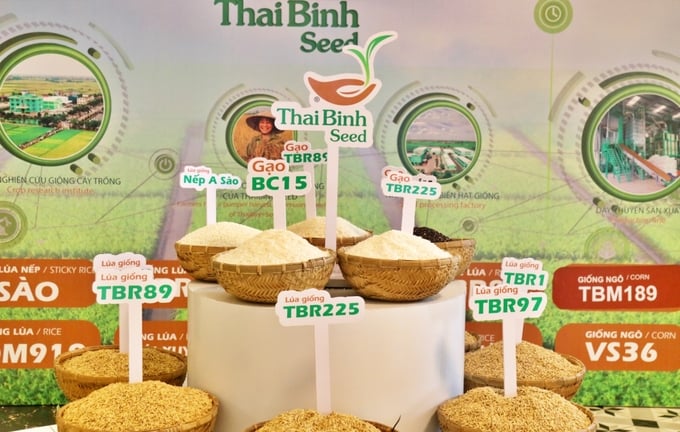
Every year, VSTA member businesses produce and import approximately 500,000 to 550,000 tons of rice seeds. Photo: PT.
Vietnam's agricultural crop varieties have enabled a stable supply and demand balance in the domestic market. Vietnam has not experienced a seed shortage within the last three years, especially with regards to major crops. Furthermore, the prices of agricultural crop varieties such as rice and maize have remained relatively stable with minimal fluctuations.
The majority of VSTA member businesses have completed the self-declaration process for the circulation of vegetable and flower seed varieties, among other non-main crops. Additionally, several companies have achieved stable business growth, leading to noticeable improvements in the living standards of workers.
Additionally, VSTA has focused on advisory and protection activities for legal rights, as well as providing encouragement and support for its members.
During the three-year implementation period of the Law on Crop Production and during the end of the transition period in late 2022 and 2023, the Association collaborated with the Vietnam Agriculture Newspaper and the Department of Crop Production to organize four conferences and workshops with the participation of various businesses and state management agencies.
During these events, numerous existing issues and impracticalities were discussed, such as the extension of seed certificates and copyrights, non-exclusive and established production of state-funded varieties, unique certified seeds, tariffs and customs duties on select types of vegetable seeds, and so on.
Furthermore, the Association has focused on technology investment, information dissemination, and international cooperation activities.
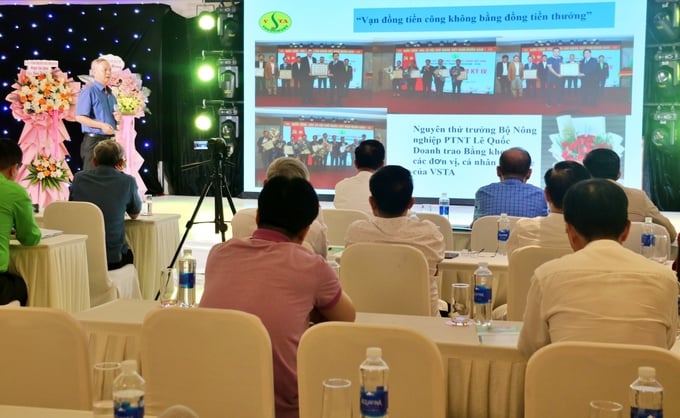
During the conference, VSTA member businesses have discussed the sustainable development of the crop variety sector.
Regarding the second half of the 2021-2024 term, the Association aims to prioritize seed quality as the cornerstone of its business; continuously improve, upgrade, and invest in its processing infrastructure, laboratories, and breeding facilities to modernize seed production.
VSTA encourages its members to invest in researching, breeding, rejuvenating, and enhancing resistance for widely circulated rice varieties with large production areas, and rice varieties certified for export to the EU.
In addition to state budget allocations, businesses need to focus on investing in the research, breeding, and production of various vegetable seeds, with an emphasis on F1 hybrid seeds.
The Association will continue to propose policies and mechanisms to promote seed processing for export, and increase income for farmers.
As a member of VSTA under the Mekong Delta Branch, Mr. Phan Quoc Thu, Chairman of the Board of Directors of Hau Giang High-Tech Agriculture Joint Stock Company, suggested the Association to strengthen connections among its members.
According to Mr. Thu, the current level of connection between Association members are inefficient. Consequently, he suggested VSTA to establish an information system emphasizing the strengths and potentials of each member to facilitate sharing and networking among businesses.
Translated by Nguyen Hai Long

(VAN) Recent outbreaks highlight the urgent need for coordinated global action to combat a virus threatening animal health, livelihoods, and pandemic preparedness.

(VAN) The Philippines temporarily halted rice imports from early September 2025, but the Vietnamese market remains stable thanks to national reserves, production linkages, and the advantages of the autumn-winter crop.
/2025/09/11/3558-1-121751_813.jpg)
(VAN) African swine fever has caused unprecedented challenges, but it also serves as a reminder of the importance of building a sustainable and responsible livestock industry.

(VAN) affirmed that Vietnam’s AVAC ASF LIVE vaccine is highly effective, raising hopes for the recovery of the country’s pig farming sector.
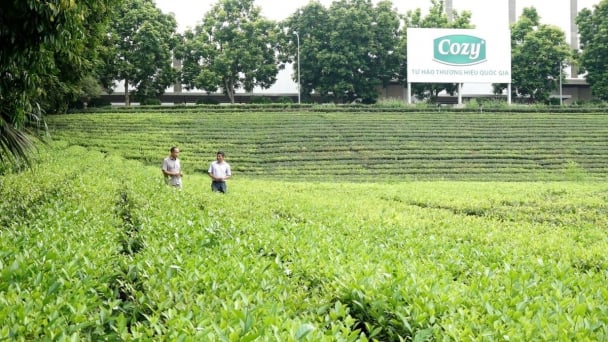
(VAN) Mr. Doan Anh Tuan, Director of The New Generation Co., Ltd also founder of the Cozy tea brand, is among the first pioneers of organic tea production in Vietnam.
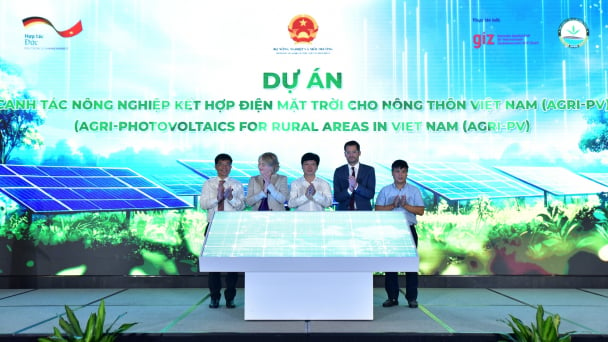
(VAN) The Vietnam-Germany agricultural photovoltaics cooperation project promotes energy transition, green and sustainable agricultural transformation.
/2025/09/09/2930-3-152452_634.jpg)
(VAN) Acting Minister Tran Duc Thang welcomed the Oregon House of Representatives delegation to discuss cooperation on agriculture and environment, trade promotion, and resource management.